-
Our work
-
Fields of work
- Arms control
- Border management
- Combating trafficking in human beings
- Conflict prevention and resolution
- Countering terrorism
- Cyber/ICT Security
- Democratization
- Economic activities
- Education
- Elections
- Environmental activities
- Gender equality
- Good governance
- Human rights
- Media freedom and development
- Migration
- National minority issues
- Policing
- Reform and co-operation in the security sector
- Roma and Sinti
- Rule of law
- Tolerance and non-discrimination
- Youth
- Field operations
- Projects
-
Meetings and conferences
- Summit meetings
- Review Conferences
- Ministerial Council meetings
- Plenary meetings of the Permanent Council
- Plenary Meetings of the Forum for Security Co-operation
- Security Review Conferences
- Annual Implementation Assessment Meetings
- Economic and Environmental Forum
- Economic and Environmental Dimension Implementation Meetings
- Human rights meetings
- Media conferences
- Cyber/ICT security conferences
- Conference of the Alliance against Trafficking in Persons
- Gender equality conferences
- Annual OSCE Mediterranean conferences
- Annual OSCE Asian conferences
- Partnerships
-
Fields of work
-
Countries
- All
-
Participating States
- Albania
- Andorra
- Armenia
- Austria
- Azerbaijan
- Belgium
- Belarus
- Bosnia and Herzegovina
- Bulgaria
- Canada
- Croatia
- Cyprus
- Czechia
- Denmark
- Estonia
- Finland
- France
- Georgia
- Germany
- Greece
- Holy See
- Hungary
- Iceland
- Ireland
- Italy
- Kazakhstan
- Kyrgyzstan
- Latvia
- Liechtenstein
- Lithuania
- Luxembourg
- Malta
- Moldova
- Monaco
- Mongolia
- Montenegro
- The Netherlands
- North Macedonia
- Norway
- Poland
- Portugal
- Romania
- Russian Federation
- San Marino
- Serbia
- Slovakia
- Slovenia
- Spain
- Sweden
- Switzerland – OSCE Chairpersonship 2026
- Tajikistan
- Türkiye
- Turkmenistan
- Ukraine
- United Kingdom
- United States of America
- Uzbekistan
- Asian Partners for Co-operation
- Mediterranean Partners for Co-operation
-
Structures and institutions
- Chairpersonship
-
Secretariat
- Secretary General
- Office of the Secretary General
- Conflict Prevention Centre
- Transnational Threats Department
- Office of the Special Representative and Co-ordinator for Combating Trafficking in Human Beings
- Office of the Co-ordinator of OSCE Economic and Environmental Activities
- Gender Issues Programme
- Opportunities for Youth
- Department of Human Resources
- Department of Management and Finance
- Office of Internal Oversight
- Documentation Centre in Prague
- Institutions
-
Field operations
- Presence in Albania
- Centre in Ashgabat
- Programme Office in Astana
- Programme Office in Bishkek
- Mission to Bosnia and Herzegovina
- Programme Office in Dushanbe
- Mission in Kosovo
- Mission to Moldova
- Mission to Montenegro
- Mission to Serbia
- Mission to Skopje
- Project Co-ordinator in Uzbekistan
- Closed field activities
- Parliamentary Assembly
- Court of Conciliation and Arbitration
- Organizational structure
- About us

Story
If they don’t hire me, I’ll do It myself: women building businesses and changing communities in Kyrgyzstan
- Date:
- Source:
- OSCE Secretariat
- Fields of work:
- Economic activities, Gender in economic and environmental activities
A passion for business helps Bermet Musaeva support her family as a single mother of four, while also empowering women in a remote village high in the mountains of Kyrgyzstan.
The idea to start a dairy business came years ago, when Bermet and her ex-husband considered leaving Kyrgyzstan for work. “But we didn’t want to leave our kids, as many of our compatriots are forced to. We couldn’t imagine being far from them and missing their important years,” shares Bermet.
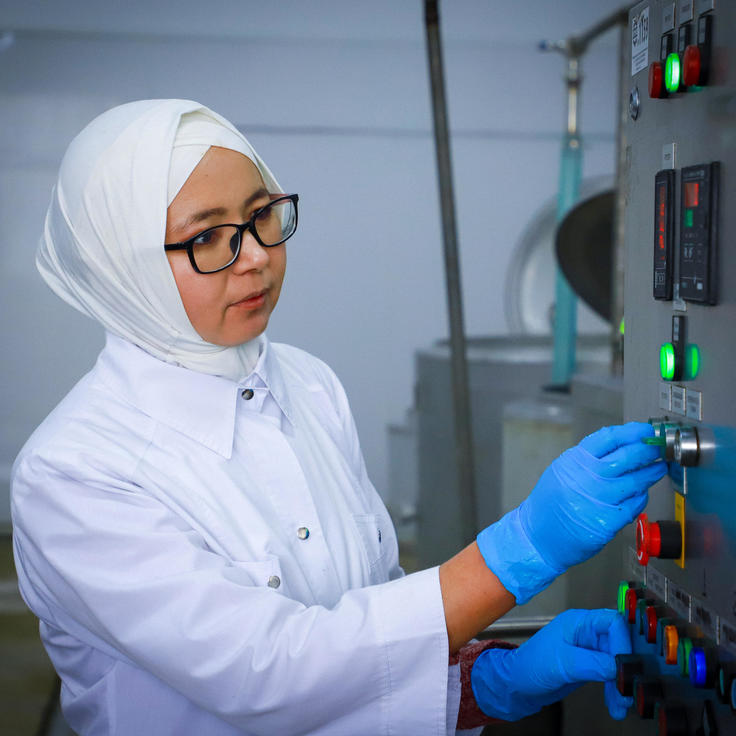
After her divorce, Bermet was left alone with four children and a business she didn’t have the experience to run. “There are very few opportunities for women entrepreneurs in Kyrgyzstan, especially in remote villages like mine.”
Despite these hurdles, she turned challenges into opportunities. She won an OSCE grant to grow her dairy business and build her entrepreneurial mindset and skills.
Today, her company Üch Bulak (Three Springs) supplies various stores across the Talas region, Kyrgyzstan, with traditional Central Asian dairy delicacies.
“With this milk, I put food on the table for my children. This job gives me so much energy, and I’m happy to give back. I’ve found my purpose in life,” the entrepreneur shares.
Bermet now employs two women from her village and leads by example. “It is heartbreaking to see many talented Kyrgyz women who can’t realize their bright ideas because they lack support from their own communities. I hope my story motivates and inspires the women around me. They can run their own companies just as I do.”
Helping children and women follow their dreams through education
For more than 13 years, Kunduz Khaidarova has been helping children in her hometown of Karakol open new doors through English education. What started as simple English-language courses has grown into a full educational centre — and in 2025, she reached a major milestone by opening her own private primary school.
Kunduz once wanted to teach English in the capital of Kyrgyzstan, but during her pregnancy she received many rejections. That is when the idea of starting her own business was born.
“If they don’t hire me, then I’ll do it myself.”
She returned to her hometown of Karakol in eastern Kyrgyzstan and launched her own educational centre, Be School, in 2012.
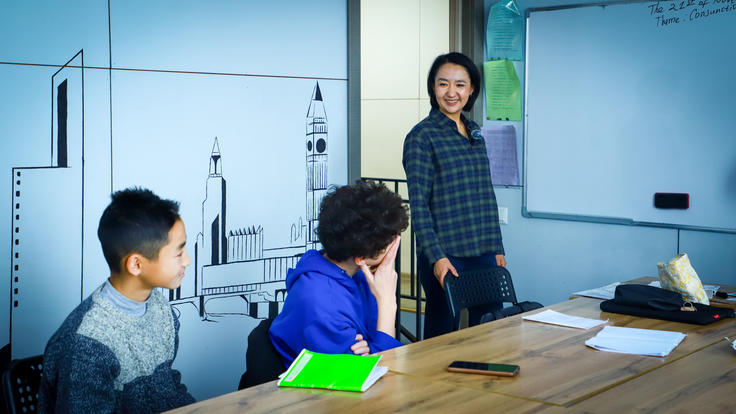
Kunduz Khaidarova speaking with students at her Be School educational centre supported by the OSCE, Karakol, 23 November 2025.
Dozens of her students now study at top universities in Kyrgyzstan, such as the American University of Central Asia. One of her graduates is earning a master’s degree at Stanford. Many others receive prestigious scholarships and continue their studies abroad. “The success of my students motivates me to keep improving what we do,” shares the entrepreneur.
For Kunduz, it’s more than just a business. “It is important to give back and invest in children — they are our future. Languages open not only new cultures but also new opportunities. I want to create a place where children not only learn English but also feel supported.”
“I think when women work in education, they give 100%. As mothers, we feel children’s needs deeply and treat them like our own.”
Kunduz’s team consists of 12 women, many of whom gain experience and move on to start their own businesses.
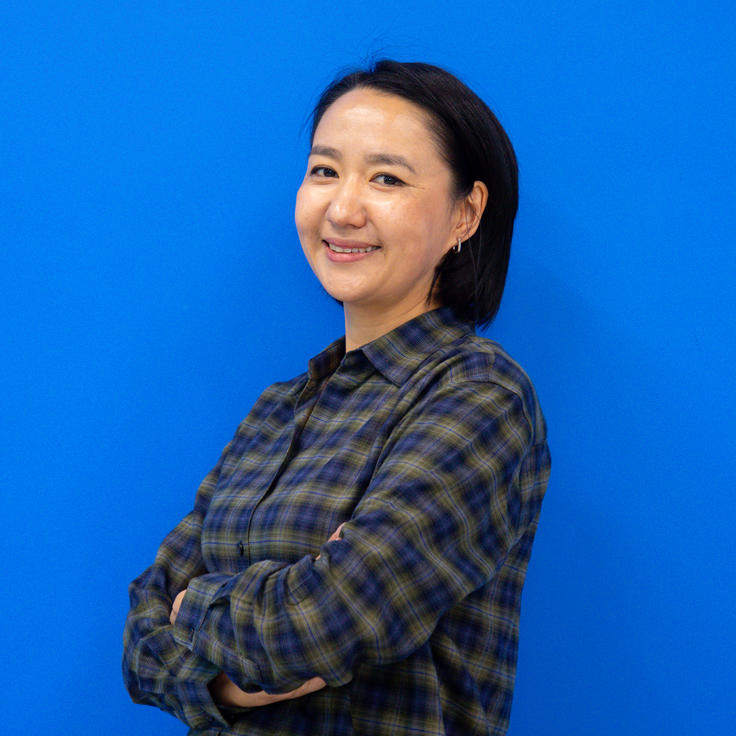
Kunduz Khaidarova, a woman entrepreneur supported by the OSCE, Karakol, 23 November 2025.
“In our country, many people believe business is only for men. But I’ve seen that women can do even better. We can be loving mothers and wives and still run a company.”
Her journey has not been easy. “During the pandemic, many people were forced to close their businesses. We also closed the school and moved everything online. After some time, we applied to the OSCE programme and became finalists. It gave us so much motivation and support. It showed us that we could keep moving forward, even though we were scared to start everything from scratch.”
Kunduz continues to lead change in the education sector. In 2025, she opened her own private primary school, which has received a Ministry of Education licence and has already enrolled its first students. She is currently searching for a larger building to expand and offer education for students above the fourth grade.
Women for women: breaking stereotypes and being there for each other
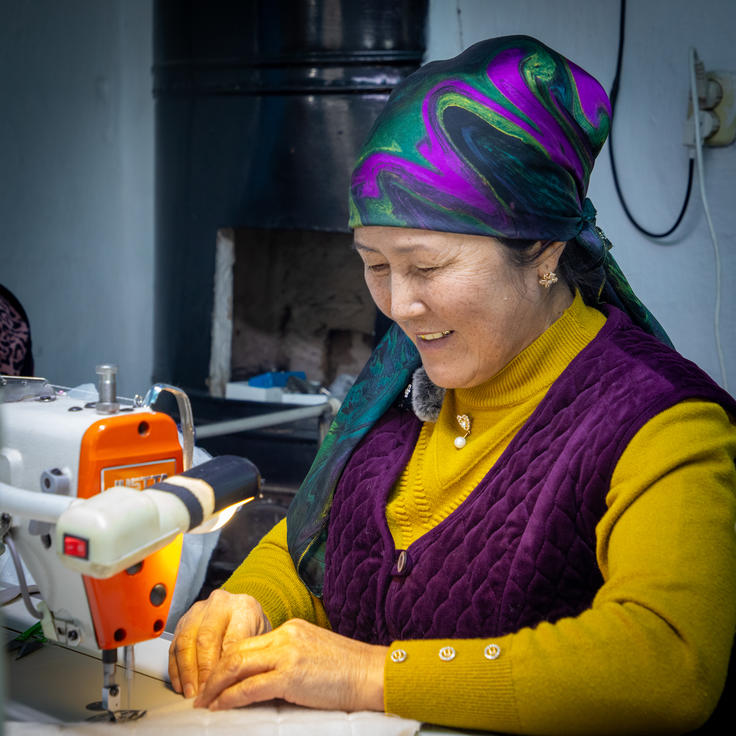
Venera Kydykova enjoying the creative process on a machine provided by the OSCE, Issyk-Kul region, 25 November 2024.
In the remote village of Chyrak, Venera Kydykova opened a sewing workshop that now employs eight women. Her story reflects both the hardship and the strength of Kyrgyz women.
Venera has always enjoyed craftsmanship and working with her hands. She used to take individual sewing orders from home, and when people in her village began opening their own small workshops, it inspired her to start a business with her husband.
Being a woman in Kyrgyzstan is not easy. “Caring for children, supporting in-laws, managing the household, and at the same time trying to work — our burden is heavy,” shares Venera.
She cares deeply for other women and is determined to change the narrative.
“This business is a big responsibility. Once we take it on our shoulders, we must see it through. When men in our village see that we are earning income, their attitudes change. They see that women are capable and talented.”
Yet they still feel resistance. Venera says that they “don’t let them break our spirit.”
“I often hear: do you think you’re all this strong and powerful? But a woman’s role is big. That’s why we support each other. When someone is struggling at home, we’re there for each other. We laugh and distract ourselves from life’s worries together,” she says.
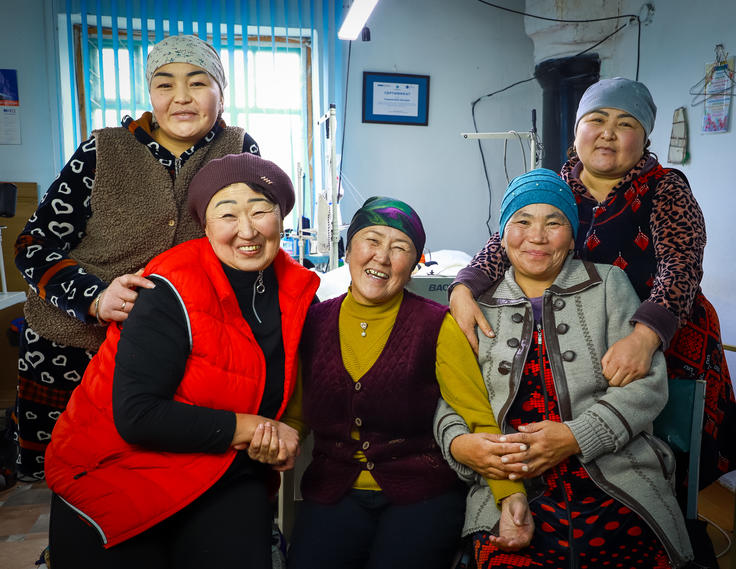
Entrepreneur Venera Kydykova with her sewing workshop team, Issyk-Kul region, 25 November 2024.
OSCE's support helped Venera build confidence: “When many people did not believe in my ideas, the sewing machines that the OSCE provided for my business made me feel that I am worthy as an entrepreneur… and that I am not alone on this journey.”
Her message is simple and powerful:
“I want all women to pursue their dreams, no matter the challenges.”
Quick Facts
About the programme
Bermet, Kunduz and Venera are among 250 women entrepreneurs who applied for the OSCE’s Women’s Economic Empowerment Programme. Since 2020, the programme has helped women launch or expand their enterprises by providing in-kind grants and business consultations, as well as skills in business planning, financial management, legal documentation, sales and marketing.
Since 2017, the OSCE Programme Office in Bishkek has been supporting the development of SMEs across Kyrgyzstan. To date, the Programme Office has helped establish and continues to support the operation of Entrepreneurship Support Centres in Batken, Issyk-Kul, Jalal-Abad, Naryn, Osh and Talas regions, with particular attention to women’s initiatives.
OSCE Impact
Discover more stories about how the OSCE improves lives.

Story
Improving the quality and accessibility of education in the Issyk-Kul province of Kyrgyzstan
30 November 2022
OSCE Programme Office in Bishkek

Story
A story of an extraordinary woman who successfully runs her business in Kadamjai, Batken province
24 January 2023
OSCE Programme Office in Bishkek